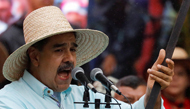Maybe the beginning of wisdom is admitting that we don’t know what we’re doing out here and, more important, we don’t have the will to invest overwhelming force for the time it would take to reshape any of these places . and, even if we did, it is not clear it would work.
So if the Middle East is a region we can neither fix nor ignore, what’s left? I’m for “containment” and “amplification.”How so? Where there is disorder . Iraq, Syria, Yemen, Libya . collaborate with regional forces to contain it, which is basically what we’re doing today. I just hope we don’t get in more deeply. Where there is imposed order . Egypt, Algeria . work quietly with the government to try to make that order more decent, just, inclusive and legitimate. Where there is already order and decency . Morocco, Jordan, Lebanon, Kurdistan and the United Arab Emirates . do everything to amplify it, so it becomes more consensual and sustainable. And where there is order, decency and democracy . Tunisia . give it as much money as they ask for, (which we haven’t done).
But never forget: We can only amplify what they do. When change starts or depends on our staying power, it is not self-sustaining . the most important value in international relations. When it starts with them, it can be self-sustaining. The best example of that is the U.A.E. and its crown jewel, Dubai. I had several conversations here on this question: Did Dubai cause the Arab awakening?Wait. How could it have? The U.A.E. and Dubai are absolute monarchies that tolerate no opposition or real freedom of the press. It’s because Dubai, beyond the glitz, glass and real estate booms and busts, has become the Manhattan of the Arab world . a place where young Arabs from across the region can come to realize their full potential in arts, business, media, education and technology start-ups . with world-class companies . and in their own culture, their own language, their own religious milieu, their own food preferences, music and clothing.
As more young Arabs came to Dubai, or viewed it on TV from afar, more and more asked: “Why don’t we have that in my Arab country?” The former Palestinian Prime Minister Salam Fayyad said to me: “People know what it means to be a citizen everywhere now.” It was one thing for young Egyptians to observe the success of Singapore or Brazil and compare it with their own flagging country, but when Dubai showed that Arabs could build a Singapore, where young Arabs could realize their potential, Dubai became politically subversive. Across the region, you heard the question: “Even if we can’t have democracy, why can’t we at least have Dubai?”“Dubai is the capital of the Arab Spring . the real revolution started here,” argued Mazen Nahawi, 39, a Palestinian who founded News Group International, a media-monitoring company here in Dubia. The Arab awakening “did not start because they wanted freedom and democracy. It started in the mind of the average [Arab] who the saw the evidence in Dubai that we could do things that are hard, and we could do them world class [like Dubai Ports and Emirates Airlines], with a high level of performance in the corporate and governmental sectors ... and with a lot of tolerance. ... And they compared that with the reality and rhetoric of the Arab military regimes” they were living under.
There is a U.A.E. government-funded incubator, called “twofour/54,” aimed at sparking an Arabic media and entertainment industry. I always try to visit. In 2008, it was incubating 15 companies. Today, it’s got 311, with filmmakers, artists and starter-uppers coming from every Arab country and South Asia.
“Al Jazeera gave Arabs a window on the world, and Dubai proved it could be done here,” added Nahawi. When you see someone just like you succeeding next door while your society is not, it becomes political. In April, ASDA’A Burson-Marsteller released its third Arab youth survey, finding: “For the third year running, the U.A.E. remains the most popular country to live in and the country Arab youth would most like their country to emulate.” The U.A.E. got 39 percent. The United States got 21 percent.
The point: It has to start with them. The best we can do is amplify. David Kilcullen, the Australian counterinsurgency expert who served with the U.S. in Iraq and Afghanistan, told me: “Just like there is a spark of life in a physical body, there has to be a spark of legitimacy and coherence in a body politic. And, if it is not there, trying to substitute for it is like putting a cadaver on a slab and harnessing a lightning bolt to it to bring it back to life. You end up with Dr. Frankenstein. You can animate a corpse and make it walk and talk, but sooner or later it’s going to go rogue. ... When you don’t have the local leadership, invading does not make things better. It makes them worse.”
스마터리빙
more [ 건강]
[ 건강]이제 혈관 건강도 챙기자!
[현대해운]우리 눈에 보이지 않기 때문에 혈관 건강을 챙기는 것은 결코 쉽지 않은데요. 여러분은 혈관 건강을 유지하기 위해 어떤 노력을 하시나요?
 [ 건강]
[ 건강]내 몸이 건강해지는 과일궁합
 [ 라이프]
[ 라이프]벌레야 물럿거라! 천연 해충제 만들기
 [ 건강]
[ 건강]혈압 낮추는데 좋은 식품
[현대해운]혈관 건강은 주로 노화가 진행되면서 지켜야 할 문제라고 인식되어 왔습니다. 최근 생활 패턴과 식생활의 변화로 혈관의 노화 진행이 빨라지고
사람·사람들
more많이 본 기사
- 신혼부부 ‘역대 최저’ 24%는 3억 이상 대출
- 통일교 특검 대신 “내란 2차 특검”… 민주당 ‘철벽 방어’
- 제미나이 추격 오픈AI 새 모델 GPT-5.2 조기 공개
- AI공급망 동맹 ‘팍스 실리카’ 8개국 참여
- “한국, 재래식 방위주도” 한미 핵협의그룹 첫 명시
- 세모(歲暮)를 보내는 마음
- TV 나와 암투병 근황 공개한 찰스 英국왕… “조기검진 중요해요”
- 굽히지 않는 젤렌스키…트럼프에 역제안 카드로 레드라인 저지
- 선교사 아들 가나대사로 금의환향… “한국·가나는 두 어머니”
- 송지효 “’런닝맨’ 출연 중 8년 ♥장기 연애했다” 폭탄 고백..멤버 모두 ‘충격’
- 뉴욕증시, 브로드컴 비관론에 AI 테마 ‘와르르’…나스닥 1.7%↓ 마감
- 변요한♥티파니, 결혼 전제 열애 인정
- ‘공공임대, 역세권에 국평으로’ 주문한 이대통령
- “박나래 前매니저 5000만원 지급? 과한 수당 요구” 주장
- MD여성골프협, 따듯한 연대로 마무리
- “’삐빅’ 비트코인으로 결제할게요”…맥도날드·편의점서도 쓴다는 ‘이곳’, 어디?
- 소셜연금 NY 2,018달러·NJ 2,190달러
- 한화, 호주 방산업체 최대주주 된다
- “귀금속 역사상 가장 극적인 재평가”…올해는 銀이 金 앞섰다 [공준호의 탈월급 생존법]
- 젤렌스키 측근 협상가가 FBI국장을 왜?…비밀회동 목적 의문
- 한국도 참여한 美주도 AI 동맹 “비시장적 관행에 공동 대응”
- 워싱턴주 홍수로 수만명 대피…주지사 “유례없는 상황 직면”
- ‘나혼산’ 박나래, 흔적도 없이 하차… 1
- 한국 교사 10명, 페어팩스 초등교 배치
- FDA, 우울증 치료 ‘뇌 자극’ 가정용 헤드셋 기기 첫 승인
- 美지상작전 임박설 속 베네수 이민자 송환 중단 놓고 ‘혼선’
- “머스크의 X, 3분기 매출 7억 달러대…순손실 5억 달러대”
- 이효리, 과거 인연도 소중.. ‘패밀리’ 김수로 만나 ‘다정’
- 전도연 “얼굴 근육 가장 많이 써…자백의 대가 이리 클 줄은”
- 종묘 일대 세계유산지구로 세운4구역 개발 영향 줄까
- ‘고가 논란’ 북중미 월드컵 티켓, 판매 첫날 500만건 신청
- 트럼프, 중남미 마약카르텔 공습 확대의지… “지상서도 시작한다”
- “보안사고 반복 땐 과징금 폭탄”… 해킹과 전면전 선포한 과기부
- ‘양육비 미지급’ 김동성 “내가 月700만원? 통장 압류된 신용불량자”
- 정국 윈터 탈퇴 요구 트럭시위에 정국 팬 응원 트럭 ‘맞불’
- 국힘·개혁신당 “통일교 특검 수용하라”…與 “정치공세·물타기”
- 정준호 얼굴 훔쳐 가짜 광고..소속사 “악의적 행위, 법적 대응”
- “원만한 마무리 원해” 성시경, 10년 의리 배신한 전 매니저 ‘선처’
- 주한미군사령관 “전작권 전환, 시기보다 조건 봐야”
- 김지민 “유부남과 불륜, 날 알리바이로 이용”..친구와 손절한 사연 [이호선의 사이다]
- 챗GPT서 ‘포토샵’ 무료 오픈AI·어도비 합의 발표
- 19개주, 트럼프 전문직 비자 ‘10만불 수수료’에 소송
- PCB, 전국 최고 중소은행 ‘올스타’ 선정
- 미일 ‘팍스 실리카’ 협력 문서 서명
- 민주, 트럼프와 여성들 함께 찍힌 ‘엡스타인 사진’ 공개…엡스타인 저택서 확보한 19장에 빌 클린턴·빌 게이츠 등 유명 인사
- “엔비디아, 中수요 반영 H200 증산”…일각선 “中, 수입거부할듯”
- 美 레전드 깜짝 전망 “한국, 북중미 월드컵 A조 1위로 32강”
- 김하성-ATL, 이대로 헤어지나→윈터미팅서만 무려 1005억 지출해버렸다
- “마약밀매·인신매매 등 국제범죄 척결” ‘국토안보 태스크포스’ 뉴욕지부 출범
- ‘오바마케어 보조금’ 올해 말 종료 가능성 ↑ 커져
1/5지식톡

-
 테슬라 자동차 시트커버 장착
0
테슬라 자동차 시트커버 장착
0테슬라 시트커버, 사놓고 아직 못 씌우셨죠?장착이 생각보다 쉽지 않습니다.20년 경력 전문가에게 맡기세요 — 깔끔하고 딱 맞게 장착해드립니다!장착비용:앞좌석: $40뒷좌석: $60앞·뒷좌석 …
-
 식당용 부탄가스
0
식당용 부탄가스
0식당용 부탄가스 홀세일 합니다 로스앤젤레스 다운타운 픽업 가능 안녕 하세요?강아지 & 고양이 모든 애완동물 / 반려동물 식품 & 모든 애완동물/반려동물 관련 제품들 전문적으로 홀세일/취급하는 회사 입니다 100% …
-
 ACSL 국제 컴퓨터 과학 대회, …
0
ACSL 국제 컴퓨터 과학 대회, …
0웹사이트 : www.eduspot.co.kr 카카오톡 상담하기 : https://pf.kakao.com/_BEQWxb블로그 : https://blog.naver.com/eduspotmain안녕하세요, 에듀스팟입니다…
-
 바디프렌드 안마의자 창고 리퍼브 세…
0
바디프렌드 안마의자 창고 리퍼브 세…
0거의 새제품급 리퍼브 안마의자 대방출 한다고 합니다!8월 23일(토)…24일(일) 단 이틀!특가 판매가Famille: $500 ~ $1,000Falcon: $1,500 ~ $2,500픽업 & 배송직접 픽업 가능LA…
-
 바디프렌드 안마의자 창고 리퍼브 세…
0
바디프렌드 안마의자 창고 리퍼브 세…
0거의 새제품급 리퍼브 안마의자 대방출 한다고 합니다!8월 23일(토)…24일(일) 단 이틀!특가 판매가Famille: $500 ~ $1,000Falcon: $1,500 ~ $2,500픽업 & 배송직접 픽업 가능LA…
케이타운 1번가
오피니언

22기 LA평통 출범에 거는 기대

연말 시즌 사기·범죄 경계해야
 메건 매카들 워싱턴포스트 칼럼니스트
메건 매카들 워싱턴포스트 칼럼니스트 [메건 매카들 칼럼] 장편영화의 마지막 챕터인가
 김미선 서북미문인협회 회장시인
김미선 서북미문인협회 회장시인 [한국춘추] 하늘을 계산한 사람들, 칠정산
 이희숙 시인·수필가
이희숙 시인·수필가 [금요단상] 그을린 자리에서 다시
 심상용 / 서울대 미술관장
심상용 / 서울대 미술관장 [미술 다시보기] 지옥에 대하여
 서정명 / 서울경제 기자
서정명 / 서울경제 기자[만화경] 주한미군과 ‘도련선 리스크’
 한 영 재미수필가협회 회장
한 영 재미수필가협회 회장 [한영의 독서칼럼] 불안한 사람들
 정영현 서울경제 테크성장부장
정영현 서울경제 테크성장부장 [여명] 콘크리트가 데이터가 됐을 뿐, 달라진 게 없다
1/3지사별 뉴스

“마약밀매·인신매매 등 국제범죄 척결” ‘국토안보 태스크포스’ 뉴욕지부 출범
연방 국토안보부가 10일 ‘국토안보 태스크포스’(HSTF) 뉴욕지부를 출범시켰다.HSTF는 마약 카르텔, 인신매매, 자금세탁, 갱단 등 국제범…
‘오바마케어 보조금’ 올해 말 종료 가능성 ↑ 커져

한국 교사 10명, 페어팩스 초등교 배치
‘글로벌 앰버서더 티처스 프로그램’(Global Ambassador Teachers Program)은 국제 교사 교환 프로그램 가운데 하나로 …
김찬수씨, 포토맥 포럼에 2천달러 기부

초강경 추방 드라이브… 한인사회 불안감 확산
도널드 트럼프 행정부가 출범 직후 불법체류자 100만 명 추방 목표 달성을 위해 초강경 조치를 본격화하면서 미주 한인사회에 불안감이 심각하게 …
<부음> 이명무 전 SF 체육회장 부인상

오늘 하루 이 창 열지 않음 닫기 





















































.png)


댓글 안에 당신의 성숙함도 담아 주세요.
'오늘의 한마디'는 기사에 대하여 자신의 생각을 말하고 남의 생각을 들으며 서로 다양한 의견을 나누는 공간입니다. 그러나 간혹 불건전한 내용을 올리시는 분들이 계셔서 건전한 인터넷문화 정착을 위해 아래와 같은 운영원칙을 적용합니다.
자체 모니터링을 통해 아래에 해당하는 내용이 포함된 댓글이 발견되면 예고없이 삭제 조치를 하겠습니다.
불건전한 댓글을 올리거나, 이름에 비속어 및 상대방의 불쾌감을 주는 단어를 사용, 유명인 또는 특정 일반인을 사칭하는 경우 이용에 대한 차단 제재를 받을 수 있습니다. 차단될 경우, 일주일간 댓글을 달수 없게 됩니다.
명예훼손, 개인정보 유출, 욕설 등 법률에 위반되는 댓글은 관계 법령에 의거 민형사상 처벌을 받을 수 있으니 이용에 주의를 부탁드립니다.
Close
x